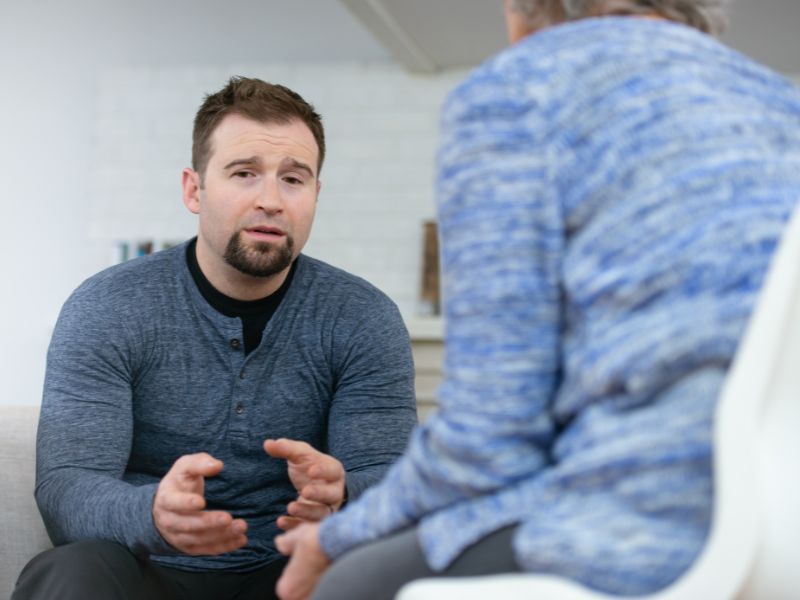Overwhelming feelings of sadness or hopelessness can make daily life unbearable. While everyone experiences low mood now and then, when these moods last longer than two weeks and interfere with your ability to keep up with your daily activities, it is important to seek professional help. Knowing when to see a therapist for severe depression in Harrow can be a vital step toward regaining emotional balance and stability.
Understanding Severe Depression
Depression is more than just a feeling of sadness. It’s a serious mental health condition that can impact mood, energy, relationships, and physical health. If left untreated, the depression may worsen over time and interfere with your daily functioning. However, with proper support and therapy, one can learn to manage symptoms and work towards healing.
Signs You Should Reach Out for Help
Depression often builds up over a period of time, during which it demonstrates the following symptoms:
● Feeling sad or hopelessness
● Emotional numbness or disconnection from others
● Sleep, appetite, or energy level changes
● Difficulty concentrating or making decisions
● Feelings of guilt, worthlessness, or failure
● Thoughts about self-harm or not wanting to live
If any of these signs resonate with you, consulting a therapist experienced in severe depression in Harrow is an important step. You can learn more about symptoms of depression and low mood at the NHS website.
What Therapy Involves
Therapy may be intimidating, especially if this is a first time for you. It is a safe, non-judgemental space where one can explore their feelings in front of a trained professional who is kind and supportive. Therapists make you more aware of negative thought patterns, develop coping mechanisms, and regain confidence. The goal of therapy is to support long-term well-being with personalised care.
Therapy Options Available in Harrow
At Focus Therapy in Harrow, several options for therapy are available to fit into your lifestyle and needs, therefore making it easier to take that first step toward recovery.
In-Person Depression Counselling
Many clients find face-to-face counselling beneficial as it fosters a direct, personal connection with your therapist. These calm and confidential sessions provide a safe space to discuss difficult feelings and start developing practical strategies to manage depression. Therapists use gentle, discussion-based techniques to help you identify negative thought patterns and replace them with healthier ones.
Online Counselling
Online counseling in Harrow is quite effective for individuals who have busy lifestyles, issues with mobility, or even those who prefer remote support. Video or audio sessions offer professional help from the comfort of your space, allowing privacy yet quality care.
Self-Esteem Counselling
Severe depression often impacts self-worth and confidence. Working with a self-esteem therapist can assist you in reframing negative beliefs and developing a healthier self-image. Explore self-esteem counselling in Harrow to begin building inner confidence and self-acceptance.
Stress Management Therapy
Since stress can exacerbate depression, managing stress effectively is crucial. Our stress management therapy teaches relaxation techniques, time management, and coping skills. These sessions help you respond calmly to pressure, identify stress triggers, and adopt healthier habits to protect your mental well-being.
Combining Therapy with Self-Care
Therapy is a powerful resource, but recovery also involves what you do outside of sessions. Self-care practices can complement counselling and make your progress more sustainable. Consider adding small, manageable routines that help you relax and reconnect with yourself.
● Take short daily walks or spend time outdoors
● Eat balanced meals and stay hydrated
● Practice mindfulness or gentle breathing exercises
● Reach out to supportive friends or family
● Keep a journal to express feelings privately
Even small steps matter. Building consistency in simple acts of care helps restore balance and supports the work you do in therapy sessions.
How to Choose the Right Therapist in Harrow
Finding the right therapist for severe depression in Harrow depends on your comfort level and what you want to achieve. Some of the clients prefer a warm, conversational approach, but others like more structured, goal-oriented sessions.
When selecting your therapist, consider these important factors:
● Their experience and expertise in treating depression and related issues
● Availability of flexible options, including in-person and online counselling
● How comfortable and safe you feel discussing your personal concerns
● The cost of sessions and how flexible scheduling is to fit your lifestyle
At Focus Therapy, we help ensure your therapy experience is positive and supportive. Before booking an appointment, you can check our sessions & fees so there are no unexpected surprises.
Choosing the right therapist is a crucial step on the path to healing, and at Focus Therapy, compassionate, personalised care is always the priority.
Taking the First Step Towards Healing
Admitting that you need help is not a weakness, its a strength and self-awareness. Although the road to recovery from severe depression may often be challenging, , but you don’t have to walk it alone. Reaching out to a therapist for severe depression in Harrow is one of the most important steps toward rebuilding hope and well-being.
Whether you choose in-person expert depression counselling in Harrow or flexible online counselling in Harrow, the key is to start somewhere. With consistent support, patience, and compassion for yourself, recovery is absolutely possible.
If you or someone close is struggling today, remember that help is within reach. You deserve to feel better, and taking that step today could open the door to a more tranquil, satisfying tomorrow.
Find Support for Severe Depression at Focus Therapy
Focus Therapy offers a safe, compassionate space for anyone experiencing severe depression. As an integrative counsellor and psychotherapist, I provide both in-person sessions in Harrow and flexible online counselling options. My person-centred approach supports you through depression, anxiety, loss, stress, and low self-esteem with tailored, empathetic sessions.
As a BACP and NCPS member, I uphold high standards of care and ethics. If you are struggling, reaching out to Focus Therapy can be the important step towards healing and renewed resilience. Contact us today.
FAQs
How can severe depression impact daily life and relationships?
Severe depression can cause low energy, withdrawal, problems with communication, and loss of interest. All these can affect relations and make everyday activities burdensome.
Is online therapy effective for severe depression?
Indeed, online therapy for severe depression can be effective, providing convenient access, professional support, and evidence-based therapeutic methods for many people.
What are the 5 stages of depression?
The five stages of depression often include denial, anger, bargaining, despair, and acceptance, reflecting emotional processes during this condition.
What are the main causes or risk factors for developing severe depression?
Main causes or risk factors include genetics, traumatic experiences, chronic stress, serious illness, substance abuse, and negative thinking patterns.
What types of treatments or therapies are most effective for managing severe depression?
Effective treatments include cognitive behavioral therapy, medications, counselling, lifestyle changes, and support groups.









